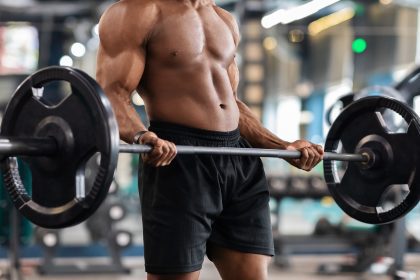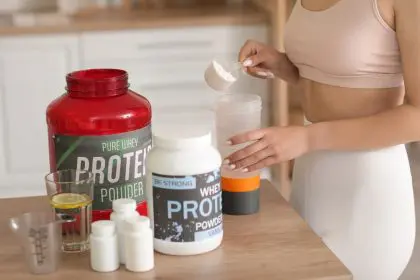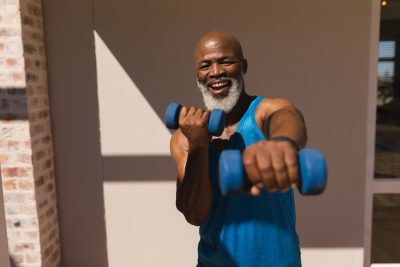You’ve just crushed an intense workout, sweat dripping, muscles burning, feeling like you’ve conquered the world. But what you do in the next 30 minutes could be the difference between achieving your dream body and spinning your wheels for months without seeing real results.
The truth about post-workout nutrition will shock you. Most people think any healthy snack will do after exercise, but the reality is far more specific and game-changing. Your body enters a unique metabolic state after intense physical activity, creating a narrow window of opportunity that can either accelerate your progress or leave you frustrated with minimal gains.
During this critical period, your muscles are literally screaming for specific nutrients to repair, rebuild, and grow stronger. Miss this window, and you’re essentially wasting a significant portion of the effort you just put in at the gym. Get it right, and you’ll be amazed at how quickly your body transforms.
The science behind post-workout nutrition reveals why some people see dramatic results in weeks while others struggle for months to achieve the same changes. It’s not about genetics or workout intensity alone – it’s about feeding your body exactly what it needs when it needs it most.
The magical 30-minute window that changes everything
Your body undergoes a remarkable transformation immediately after exercise. Blood flow increases to your muscles, cellular repair mechanisms activate, and your metabolism shifts into high gear. This creates what fitness experts call the anabolic window – a brief period when your body is primed to absorb and utilize nutrients with incredible efficiency.
During this window, your muscles become like super-absorbent sponges, ready to soak up the building blocks they need for repair and growth. Your body’s insulin sensitivity skyrockets, meaning nutrients get shuttled directly to where they’re needed most rather than being stored as fat.
The glycogen stores in your muscles become depleted during exercise, creating an urgent need for replenishment. Your body prioritizes refilling these energy reserves, which means the carbohydrates you consume during this period are more likely to fuel your next workout rather than contribute to unwanted weight gain.
Protein synthesis – the process by which your body builds new muscle tissue – increases dramatically after exercise. This process can continue for up to 48 hours, but it’s most active in the first few hours post-workout. Providing your body with the right amino acids during this period can significantly enhance muscle growth and repair.
1. The protein powerhouse that rebuilds your muscles
Protein becomes your body’s most critical need immediately after exercise. Your muscles have been broken down at the microscopic level during your workout, and they need amino acids – the building blocks of protein – to rebuild themselves stronger than before.
The type of protein you choose matters more than you might realize. Fast-absorbing proteins get to work immediately, delivering amino acids to your muscles when they need them most. Whey protein, found in dairy products, dissolves quickly and gets absorbed rapidly by your digestive system.
Complete proteins contain all nine essential amino acids your body can’t produce on its own. These amino acids work together synergistically, with each one playing a specific role in muscle repair and growth. Without all nine, the muscle-building process becomes inefficient and incomplete.
The amount of protein you need depends on your body weight, workout intensity, and fitness goals. Generally, consuming 20-40 grams of high-quality protein within 30 minutes of finishing your workout provides optimal muscle protein synthesis without overwhelming your digestive system.
2. The carbohydrate secret that fuels your recovery
While protein gets most of the attention, carbohydrates play an equally crucial role in post-workout recovery. Your muscles store energy in the form of glycogen, which gets depleted during exercise. Replenishing these stores quickly is essential for recovery and preparing your body for the next workout.
Fast-digesting carbohydrates provide immediate energy that your muscles can absorb and utilize quickly. These carbs cause a rapid rise in blood sugar, which triggers insulin release. This insulin helps shuttle nutrients into your muscle cells more efficiently, enhancing both glycogen replenishment and protein synthesis.
The timing of carbohydrate consumption can significantly impact your recovery and performance. Consuming carbs immediately after exercise takes advantage of your body’s enhanced ability to absorb and store glucose. Waiting too long means missing this optimal absorption period.
Different types of carbohydrates serve different purposes in recovery. Simple carbs provide quick energy replenishment, while complex carbs offer sustained energy release. The ideal post-workout approach often combines both types to maximize recovery benefits.
3. The fat factor that supercharges hormone production
While carbs and protein get most of the spotlight, healthy fats play a surprisingly important role in post-workout recovery. Fats are essential for hormone production, including testosterone and growth hormone – both crucial for muscle building and recovery.
Omega-3 fatty acids possess powerful anti-inflammatory properties that can help reduce exercise-induced muscle damage and soreness. These healthy fats support the recovery process by minimizing excessive inflammation while allowing the beneficial inflammatory response needed for muscle adaptation.
Fat consumption after exercise also helps with the absorption of fat-soluble vitamins like vitamins A, D, E, and K. These vitamins play important roles in bone health, immune function, and overall recovery. Without adequate fat intake, your body may not fully utilize these essential nutrients.
The timing of fat consumption requires more consideration than carbs and protein. While some fat in your post-workout meal is beneficial, too much can slow digestion and delay the absorption of other nutrients. A small amount of healthy fat – about 10-15 grams – provides benefits without interfering with recovery.
4. The hydration hack that doubles your performance
Water might seem like an obvious choice, but proper post-workout hydration involves more than just drinking plain water. During exercise, you lose not only water but also electrolytes – minerals that are crucial for muscle function and cellular processes.
Sodium, potassium, and magnesium are the primary electrolytes lost through sweat. These minerals help regulate fluid balance, muscle contractions, and nerve function. Replacing them quickly after exercise helps restore optimal cellular function and supports faster recovery.
The amount of fluid you need depends on how much you lost during exercise. A general rule is to drink 150% of the fluid you lost through sweat. This means if you lost one pound during your workout, you should consume about 24 ounces of fluid to fully rehydrate.
Adding a small amount of sodium to your post-workout fluids can enhance absorption and retention. Sodium helps your body hold onto the water you’re consuming rather than quickly eliminating it through urine. This leads to better hydration and more effective recovery.
5. The micronutrient miracle workers
Vitamins and minerals might be needed in small amounts, but their impact on post-workout recovery is enormous. These micronutrients serve as cofactors in countless cellular processes, including energy production, protein synthesis, and tissue repair.
Vitamin C supports collagen synthesis, which is essential for connective tissue repair and muscle recovery. This powerful antioxidant also helps combat the oxidative stress created by intense exercise, protecting your cells from damage while supporting the adaptation process.
B-vitamins play crucial roles in energy metabolism, helping your body convert the food you eat into usable energy. They’re also involved in red blood cell formation, which is important for oxygen delivery to your recovering muscles.
Minerals like zinc and magnesium are involved in protein synthesis and muscle function. Zinc deficiency can impair muscle recovery and growth, while magnesium helps with muscle relaxation and can reduce cramping and soreness.
Perfect post-workout meal combinations
Creating the ideal post-workout meal involves combining the right ratios of protein, carbohydrates, and fats while considering timing and individual needs. The goal is to provide your body with everything it needs for optimal recovery without overwhelming your digestive system.
A chocolate milk and banana combination provides fast-absorbing protein and carbs in an easily digestible form. The natural sugars in both foods help replenish glycogen stores quickly, while the protein supports muscle repair and growth.
Greek yogurt with berries and honey offers a perfect balance of complete protein, simple and complex carbs, and beneficial probiotics. The probiotics support gut health, which is increasingly recognized as important for overall recovery and immune function.
A turkey and avocado wrap provides lean protein, healthy fats, and complex carbohydrates in a portable, convenient package. The combination of nutrients supports sustained energy release and comprehensive recovery.
Egg whites with sweet potato create a powerful combination of high-quality protein and nutrient-dense carbohydrates. Sweet potatoes provide vitamins, minerals, and antioxidants that support recovery while replenishing energy stores.
Timing strategies that maximize results
The timing of your post-workout nutrition can be just as important as what you eat. The famous 30-minute anabolic window, while not as rigid as once believed, still represents a period of enhanced nutrient absorption and utilization.
Consuming nutrition within the first hour after exercise takes advantage of increased blood flow to your muscles and enhanced insulin sensitivity. This timing helps ensure that the nutrients you consume are preferentially used for recovery rather than storage.
For intense or long-duration workouts, immediate nutrition becomes even more critical. Your body’s glycogen stores may be severely depleted, and muscle protein breakdown may be elevated. Quick nutrition intervention helps shift your body from a catabolic state to an anabolic one.
Individual factors like training status, workout intensity, and daily nutrition habits can influence optimal timing. Well-trained individuals may have a longer window for nutrient timing, while those new to exercise may benefit from more immediate post-workout nutrition.
Common mistakes that sabotage your progress
Many people unknowingly sabotage their workout results through poor post-exercise nutrition choices. Understanding these common mistakes can help you avoid wasting your hard-earned efforts in the gym.
Skipping post-workout nutrition entirely is perhaps the biggest mistake. Some people think they’ll lose weight faster by not eating after exercise, but this approach can actually slow down metabolism and hinder muscle development.
Consuming too much fat immediately after exercise can slow digestion and delay the absorption of protein and carbohydrates. While some fat is beneficial, timing and amount matter significantly for optimal recovery.
Relying solely on sports drinks or supplements while ignoring whole food sources can leave you missing important micronutrients and fiber. Whole foods provide a complex matrix of nutrients that work together synergistically.
Eating too much too quickly can overwhelm your digestive system and actually impair nutrient absorption. Your body can only process so much at once, so moderate portions consumed consistently tend to be more effective than large meals.
Customizing your approach for your goals
Different fitness goals require slightly different post-workout nutrition strategies. Understanding how to adjust your approach based on your specific objectives can significantly improve your results.
For muscle building goals, emphasizing protein intake becomes crucial. Consuming adequate protein consistently after workouts provides the building blocks needed for muscle growth and helps maintain a positive protein balance throughout the day.
Weight loss goals require a more balanced approach that supports recovery while maintaining a caloric deficit. Focusing on nutrient-dense, lower-calorie options helps ensure you get the nutrition you need without exceeding your energy needs.
Endurance athletes need to prioritize carbohydrate replenishment to restore glycogen stores for subsequent training sessions. The volume and frequency of training often require more aggressive carbohydrate replacement strategies.
Strength and power athletes benefit from a combination approach that supports both energy replenishment and muscle protein synthesis. The high-intensity nature of their training creates significant demands for both carbohydrates and protein.
Building sustainable habits for long-term success
The most effective post-workout nutrition strategy is one you can maintain consistently over time. Building sustainable habits requires finding approaches that fit your lifestyle, preferences, and practical constraints.
Meal prep can be a game-changer for consistent post-workout nutrition. Preparing portable, ready-to-eat options ensures you always have appropriate nutrition available immediately after exercise.
Having backup options for different scenarios helps maintain consistency even when plans change. Keeping shelf-stable options like protein powder, nuts, or dried fruit available provides flexibility when fresh options aren’t accessible.
Learning to listen to your body’s signals helps you adjust your approach based on how you feel and perform. Some days you may need more carbohydrates, while other days protein might be more important based on your workout and recovery status.
The compound effect of consistent nutrition
The real magic of post-workout nutrition isn’t in any single meal or snack – it’s in the compound effect of consistent, strategic nutrition choices over time. Each post-workout meal is an investment in your future progress and performance.
Consistent post-workout nutrition helps establish a positive recovery cycle where each workout builds upon the previous one. Your body becomes more efficient at utilizing nutrients, recovering faster, and adapting to training stress.
The psychological benefits of consistent post-workout nutrition shouldn’t be underestimated. Knowing you’re fueling your body properly creates confidence and motivation that extends beyond nutrition into other aspects of your fitness journey.
Over time, strategic post-workout nutrition becomes second nature, requiring less conscious effort while delivering increasingly noticeable results. This automaticity helps ensure long-term success and continued progress toward your fitness goals.
Your post-workout nutrition choices represent one of the most powerful tools you have for maximizing your fitness results. By understanding what your body needs and when it needs it, you can transform your workouts from simple calorie-burning sessions into powerful body-transformation opportunities. The key is consistency, quality, and timing – three elements that, when combined properly, can accelerate your progress beyond what you thought possible.


















